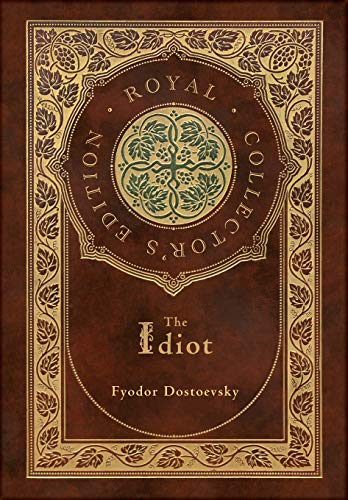The Idiot (Royal Collector's Edition) (Case Laminate Hardcover with Jacket)
Fyodor Dostoevsky
BOOK REVIEW

There's a certain madness that seeps through the pages of The Idiot by Fyodor Dostoevsky, a novel that unearths the raw, unfiltered essence of humanity. Within its labyrinth of characters and chaotic societal dimensions lies a tale of innocence confronting the harsh realities of a cynical world. Dostoevsky, with his unparalleled psychological insight, takes us on a journey through the mind of Prince Myshkin-a man whose purity is both a blessing and a curse amidst a society rife with manipulation, greed, and moral decay.
At first glance, Myshkin seems to embody the notion of the "holy fool," as he exudes a simple grace and kindness that draws both admiration and contempt from those around him. But this is where the brilliance of Dostoevsky's work shines. The author skillfully constructs a world where Myshkin's innocence becomes a scintillating contrast to the duplicity of the aristocratic circles in Russia. This juxtaposition forces readers to grapple with their own perceptions of morality, sanity, and the human condition. Is it Myshkin who is the fool, or is it the society that labels him as such?
Dostoevsky, writing in the mid-nineteenth century, was deeply affected by the tumultuous social fabric of his time-a period marked by shifting ideologies and existential despair. His life experiences fueled his works, where he often wrestled with themes of faith, suffering, and redemption. Notably, The Idiot emerged after a stint in prison, a time that profoundly influenced his understanding of human nature and injustice. As you delve into the pages of this masterpiece, it becomes clear that every character is a complex representation of the myriad aspects of society, offering raw and often unflattering reflections of ourselves.
Readers often find themselves ensnared by the provocative dynamics between Myshkin and other iconic figures such as the alluring Nastasya Filippovna and the enigmatic Aglaya Epanchin. These relationships whirl in a tempest of passion, yet it's Myshkin's unwavering compassion that sets the stage for countless tragedies. As opinions on the book reveal, many find themselves torn: some hail it as a profound exploration of existentialism, while others criticize it for its pacing and complex narrative style. Yet, this ambiguity only enriches the experience, igniting discussions about the fundamental questions of life and love.
The fervent critiques are not without merit. Readers have noted how moments of inertia might distract from the novel's intense philosophical undercurrents, while others passionately defend it, arguing the character depth and societal critique outweigh any slow pacing. There's a shared sentiment that Dostoevsky's exploration of the human psyche resonates deeply, lingering in the minds and hearts of readers long after the final pages are turned.
As you digest this narrative woven with threads of desperation, hope, and disillusionment, reflect on how The Idiot speaks to our contemporary world-a world ironically filled with complexities and chaos mirroring those of Dostoevsky's Russia. The innocent, as represented by Myshkin, often stand juxtaposed against a backdrop of moral ambiguity and social pretense. This tension echoes in our lives today, as we navigate through a landscape cluttered with conflicting values and despotic impositions.
The haunting beauty of The Idiot lies not just in the plot itself, but in how it challenges you, the reader, to unearth truths about your own existence. It beckons you to confront the uncomfortable idea of foolishness in rationality and the strength found within vulnerability. Dostoevsky holds up a mirror, and the reflection can be confronting-are you comfortable with what you see?
In conclusion, the legacy of The Idiot continues to loom large, influencing countless writers and thinkers across generations. Dostoevsky's exploration of the human heart, with all its frailties and profound depths, remains a powerful testament to his genius. The question lingers: Can we embrace the fool within ourselves, or will we continue to dance on the edges of societal expectations? The answer, dear reader, may just reshape your understanding of humanity itself.
📖 The Idiot (Royal Collector's Edition) (Case Laminate Hardcover with Jacket)
✍ by Fyodor Dostoevsky
🧾 584 pages
2021
#idiot #royal #collectors #edition #case #laminate #hardcover #with #jacket #fyodor #dostoevsky #FyodorDostoevsky